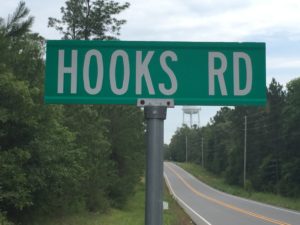 Truth is, the success of your song is based entirely on the strength, originality, emotion, and memorability of your primary idea as expressed in the “hook.”
Truth is, the success of your song is based entirely on the strength, originality, emotion, and memorability of your primary idea as expressed in the “hook.”
Sounds easy enough, but most songwriters struggle to come up with original hooks that pack the kind of punch they need to stand out from a million other songs. If you look at the most popular songs in any genre, the “hook” is what makes the song work the way it does and connect with listeners in a bigger way than average songs.
But how does that really happen and how can you make sure your hooks are the “power hooks” you want to have working for you? I think it comes down to a few key principles you can start using right away in your songs.
First, be sure you know what a HOOK really is.
A hook is what captures the imagination and ears of your audience.
Just like the fishing hook, you’re angling for the listener’s interest and imagination with your concise idea and words/melodies you construct to express it. And remember, you’re competing with a lot of noise to gain the attention of a listener. If your idea isn’t very strong, your hook won’t be strong, either. People talk about “ear worms” when a certain phrase or melody is on REPEAT in their heads and that’s exactly the kind of bait you want to use. I caught an ear worm recently with the worship song Ever Be (Strand, Greely, Wilson, Heiligenthal), which is repetitive enough, but I guess that was better than Happy Birthday or Jimmy Cracked Corn, right?
If your hook is just like a million others, it’s probably not a “power hook” and you need to up the originality of the phrase and idea itself. Consider these classic hooks and take a minute to think about why they’re so powerful.
Stop in the Name of Love (Eddie Holland – recorded by Diana Ross, 1965)
Crazy (Willie Nelson – recorded by Patsy Cline, 1962)
I Can’t Make You Love Me (Reid/Shamblin – recorded by Bonnie Raitt, 1991)
Don’t Stop Believin’ (Perry/Cain – recorded by Journey, 1981)
Amazing Grace/My Chains Are Gone (Newton/Tomlin – recorded by Chris Tomlin, 2007)
How Great Is Our God (Tomlin, Cash, Reeves – recorded by Chris Tomlin, 2004)
… and many, many more
You would do yourself a huge songwriting favor to make sure you believe you have a super-strong hook before ever sitting down to write. Ask yourself if this hook is close to others that have already been written. Is the idea fresh or dated? What’s the essence of the idea and could it be crafted better to stand out and attract attention?
Try identifying the essence of what you want to say in the song, that one big idea, and then try to write ten different hooks about it.
You may decide your original hook was just a starting point for what the song should really become. The better you get at brainstorming hooks, the more great hooks you’re going to come up with. If you stop with what Berklee Press author Mark Simos calls a “song seed,” it may never grow into the mature hook you want and the best possible song may never be written from it (Songwriting Strategies: A 360º Approach; Simos: Berklee Press, 2014).
Hooks are almost always the title, though there are notable exceptions such as Myrin/Redman’s 10,000 Reasons, where the actual “hook” is the phrase “Bless the Lord, o, my soul.” The phrase “ten-thousand reasons” makes a cameo appearance in a verse, but isn’t the repetitive or most highlighted phrase in the song.
Secondly, some writers aren’t always objective enough about their writing to recognize whether or not their hooks are original, emotional, or compelling.
Songwriters can feel so emotionally close to something from their hearts that they can’t see that the idea is overly familiar, perhaps something we’ve heard a million times, and thus banishing their song to musical obscurity. Taking a giant step back from your song to try to recognize the power it does/doesn’t have is an effort worth making if you want to improve and give your songs a chance to be heard. This process can be like when kids grow out of crayons and into more mature art. The more objectivity, the better the art, especially if some skill is coupled with the natural talent.
Crafting power hooks is an art form.
And finally, the number one way to write power hooks is to listen constantly to music and actually study why they’re working. Why do so many people like/love this song and what makes it go viral? Whether you like it or not is beside the point.
If millions of people (except maybe you) are liking it and your goal is to have people like your song, how can you shift your understanding to use the principles the other writers used? Think “reverse engineering” and see if you can actually start to “get” what makes these songs work. When you insist on “writing from your heart” but don’t know how to really craft a song, odds are you’re not going to hit the mark.
Why not learn to craft songs well to express what’s in your heart?
A commercial song is no less written “from the heart” than a less successful one. Why not figure out how the greatest songs are written and implement what you learn? For example, Cracker Barrel isn’t my favorite restaurant, but millions of people love it. If I were trying to figure out how to have a successful food chain for the majority of “middle Americans,” going all foo-foo and haute’ cuisine probably wouldn’t work. If I let my bias keep me from really understanding what people want and how they best access it, I’ll never have a hit restaurant or a hit song.
Learn to listen for power hooks happening all around you.
And finally, learn to listen for power hooks happening all around you.
Almost every popular song was born out of daily conversation, reading great books and literature, poetry, other songs, television, movies, and the newspaper. Finding and recognizing power hooks is a discipline, a skill you develop just by deciding to pay attention to the things you see and hear every day. Sometimes you have to use some imagination to turn a phrase, i.e. Reid/Shamblin’s brilliant “I can’t make you love me, if you don’t” phrase. It just wouldn’t be the same written, “If you don’t love me, I can’t make you.”
Keep your radar scanning everything around you for hook ideas. Start listening critically and write down ideas as you hear them race by, or they’ll be lost forever. You’ll never remember them to come back to them later. Eric Church said, “The key to songwriting is just to be able to observe, and put yourself in situations to be around people, and let those ideas come to you.” Those ideas come by observation, keen listening, and the ability to shape words into phrases and titles that will capture the very people you’re listening to.
Obviously, the “hook” of a song is more than the lyric phrase. The best hooks happen when a brilliant melody is married to a brilliant lyric. There are “melodic hooks” just like there are lyric hooks. When they come together perfectly we have just the right emotion, just the right originality, and just the right combination to make the song memorable and accessible to the greatest number of people. That’s when a song will outlive the writers and the artists who originally performed it.
Anyone can put words to a melody. Few can write a truly great song.
Most people want “tips and tricks” for their songwriting instead of learning how to think like a real songwriter. Apply these three things to your writing and I bet you’ll start coming up with power hooks more often and greatly increase the quality and impact of your songs.

I like the idea of “hooks happening all around us”. Something to really listen for!